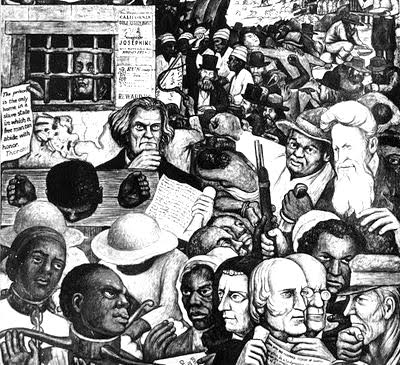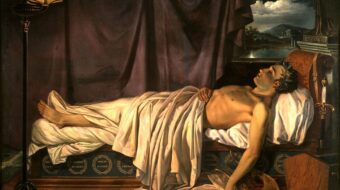
Upon the capture and arrest of abolitionist John Brown, a man ran to the church tower in the center of Concord Massachusetts. He was full of fury and pain. Of lithe and willowy build, this impassioned human being was known locally more as a contemplator than a man of action. Yet here he was streaking to ring a clarion bell.
He was harkening to his fellow citizens, not only an alarm of the week’s events, but also a warning of dark days ahead unless the scourge of slavery was expunged from the land. It was October 30, 1859. That man was Henry David Thoreau.
Some short-lived acts speak volumes of the person. So it was that autumn day in the life of Henry David Thoreau. Its message rung out loud and clear as did the pealing of the bell warning of consequences for his town and country if the inhumanity and genocide of slavery were to continue.
Sometimes we also learn of a person in a back-door kind of way. Martin Luther King and Mahatma Gandhi, who need no introductions, carried with them the essays of Mr. Thoreau. Reformers and revolutionaries still do. That is why, now as then, apologists for the maintenance of the way things are, will try to discredit them. They want to take the powerful writings of a mid-nineteenth century American away from reformers and revolutionaries and those heading in that direction.
The latest of these apologists to fail is Kathryn Schulz. She tries to “uncool” Thoreau in The New Yorker magazine essay entitled Pond Scum. Schultz accuses the architect of American environmentalism of being a “misanthropic, arrogant, self-righteous prig.” Really?
Schulz’s first broadside came as she cherry picked a quote from Thoreau that she obviously believed lends itself to misinterpretation. In 1849, a ship carrying Irish immigrants was dashed on the shores of Cohasset, Mass. Only a fraction of the passengers survived.
Thoreau was travelling to Cape Cod at the time and viewed the scene along the shore. “On the whole, it was not so impressive a scene as I might have expected. If I had found one body cast upon the beach in some lonely place, it would have affected me more. I sympathized rather with the winds and waves, as if to toss and mangle these poor human bodies was the order of the day.”
What was Thoreau saying here? Simple. We are all quite familiar with being overwhelmed by the shear magnitude of a tragedy. The events of 9/11 are an unfortunate, good example. How many of us had to turn our televisions off because the scenes began to overwhelm us with grief and sorrow? Thoreau, similarly overwhelmed, points to the storm itself as unwittingly being part of the tragedy.
Henry David Thoreau pointed out that seeing “one body” would suffice to grasp the tragedy. Concerning the Syrian refuge crisis, how many of us are overwhelmed by the 90 percent civilian casualty rates there? Yet the one picture of a little toddler washed up on a beach moved more to take action to help, especially in Germany.
There is still more. You would think Ms. Shultz, a writer, would have understood Thoreau’s use of paradox. He quite often used this technique to have a jarring effect. A self-contradictory statement is used to show a universal truth.
David Brooks of The New York Times trumpeted Schulz’s demonizing of Thoreau. Why? Because her writing was among the Sidney Awards, essays that best represent the outlook and thinking of one Sidney Hook.
Who was he? Sidney Hook was a right-wing social democrat and one of the arch promulgators of the Cold War. He was particularly involved in driving communists and other progressives out of government. In other words, he helped construct the black list that the recent movie Trumbo exposes. Brooks and Schulz, and those of their ilk, are apparently comfortable with Hook’s company.
Sometimes in cherry-picking essays a statement is included, almost a disclaimer, that says something like this. ” Oh yes, he was a wicked fellow but he did this one honorable thing.” Shultz uses this disclaimer technique in a failed attempt to slip her gross distortion of Thoreau past unsuspecting readers. In her essay of over 40 paragraphs, she includes one recognizing Henry David’s avowed antislavery positions. The 40 to one ratio is hardly a balanced assessment of this anti-war, equal rights activist. It is a gross distortion.
Thoreau was an abolitionist. Abolitionists were at the heart of the movement to free black Americans. Frederick Douglass, who, along with Karl Marx, urged President Lincoln to allow freed slaves to join Northern troops in the Civil War, can be counted among them. The roots of the socialist and communist movements of the 20th century can be found here.
The apologists for the way things are, or were, will always peck around the edges of a Thoreau or a Mandela or a Rachel Carson or a Wangari Maathai. It’s their essence that really scares them. It’s those essences, that blend of reform and revolution we must embrace.
Why attack a noted figure and really, a progressive movement of the past? Fear. People are on the move. The drive for the $15 minimum wage, Black Lives Matter, anti-climate change, and renewable energy are on the move and growing with break-neck speed.
The Climate March of the fall of 2014 put the heebie jeebies into ruling circles, especially the fossil fuel boys. Seeing peace, labor, green, and social justice groups united in a common cause put the fear in them. Thus the apologists of the past take their pens out?
Read Thoreau. You will find yourself there. Like all giants of the past, Henry David Thoreau writes in a different period of time but speaks to us today. One line in his moving eulogy of John Brown does this best. “Only what is true, and strong, and solemnly earnest will recommend itself to our mood at this time.”
Photo: Panel from Diego Rivera’s mural at Pennsylvania’s Unity House, depicting the growing conflict over slavery that eventually led to the Civil War. Also included are references to the Mexican War and the discovery of gold in California. Important figures include Henry David Thoreau, Zachary Taylor, Winfield Scott, John C. Calhoun, Nat Turner, John Brown, Frederick Douglass, and Harriet Beecher Stowe. (Kheel Center for Labor-Management Cornell University/CC)












Comments